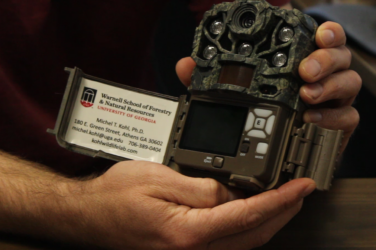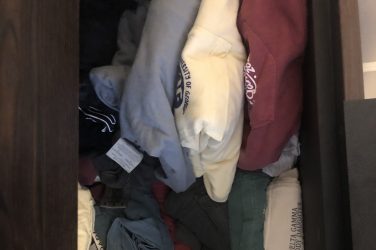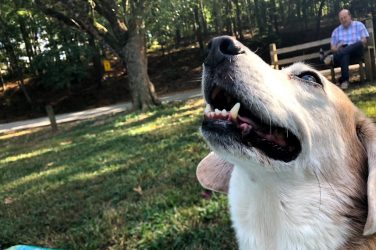Election day is just under six weeks away when I first meet Stephen Vest.
It’ll be the first presidential election for many college students, including Vest. As a 19-year-old political science major at the University of Georgia, he’s looking forward to casting his first presidential ballot in such a monumental race.
But while stark differences have seemingly cut the country down a harsh line of red or blue, Vest is torn.
He’s one of the 8% of Georgia voters who are still undecided when we meet at the Jittery Joe’s coffee shop in the Miller Learning Center on UGA ’s campus. I wait in a booth as conversations fill the air — students working on group projects, casually catching up with friends or simply cutting through on the way to their next class.
Vest appears wearing a black T-shirt with the UGA logo, his shaggy brown hair is covered by a trucker hat with “DESTIN, FL” printed on the front. He takes the seat across from me in the booth, and we start to chat about what matters to him — both in this election and his personal life.
He tells me that he’s driven by three F’s: friends, family and faith.
His mom, dad and younger sister all live in Marietta, with his cousins right down the road. They grew up together and are more like his brothers. When it’s not football season, he drives home to visit them weekly.
He tells me that they all know who they’re going to vote for. His mom, like Vest, is registered Independent but wants to see the first woman president and is excited to vote for Kamala Harris. His Dad, once a lifelong Republican, has voted for a Democrat in every election since Obama in 2008.
I try to ascertain what qualities Vest is looking for in a president. He tells me that assertive leadership is critical — he wants someone that clearly states their goals and actually follows through on them. His favorite politician is Ron DeSantis for this reason.
Neither Trump nor Harris is Vest’s first choice, but he’s committed to vote for one of the two in November. He knows the importance of this race and wants to vote for someone with a chance of winning. His first time voting was during the Republican primaries over the summer; he wrote in Ron DeSantis as the stakes felt lower.
Vest likes tangible plans. He thinks that the Trump administration has been unclear with their stance on abortion, but also thinks that Harris’ ‘brat’ branding distracts from the topics he cares about. He’s going into these last few weeks hoping to see clear and actionable policies from the candidates.
After talking for an hour, I pack up my belongings to go to my next class. We make plans to watch the vice presidential debate together next week.
When I arrive at Vest’s off-campus apartment the following Tuesday, the CBS News pre-debate coverage is already playing on the living room TV. His three roommates are home, but they all have their doors shut — none of them are as interested in politics.
Before it starts, Vest offers me some pumpkin pie. Being a good host is important to him; growing up, his mom always emphasized hospitality. As he sits down on the couch, he shares his hope that this debate will be more laid-back like the 2012 Obama versus Romney matchup.
He expresses disappointment when the candidates fail to shake hands as they walk in.
Walz and Vance both had positive moments in Vest’s eyes. Walz quoting Matthew 25:40 when discussing immigration piqued interest, as did Vance’s compassion towards Walz when he described his son witnessing a shooting.
Vest likes that there aren’t any personal attacks between the candidates. For undecided voters in Georgia, 26% consider personality to be the biggest concern about Trump. His aggressive rhetoric toward immigrants and his political opponents have been hard for Vest to shake as well.
Vest has struggled with anxiety his whole life and got diagnosed with autism in sixth grade. As a strong advocate of therapy who attends every Friday, he took it personally when Trump called Harris “mentally impaired.” Walz and Vance are doing a better job at avoiding that kind of language.
An hour and a half later, Vest feels more informed about the candidates’ platforms than before the debate.
But he still doesn’t have a definitive answer. He takes note of a QR code on the bottom of the TV screen directing viewers to a CBS fact-check of the night’s claims. He plans to look into the validity of the candidates’ statements in the coming days.
A week goes by before I meet Vest again at the Miller Learning Center. The Young Democrats and Students for Trump, both campus organizations with large followings, are canvassing outside. Through their tabling events, Vest’s gotten to know both groups well during the election season.
Wearing the same Florida trucker hat as the day we first met, he shares that some of his thoughts have shifted since the debate. With Election Day under four weeks away, he’s starting to doubt some of the Harris campaign’s claims.
He recalls a specific moment during the debate where moderators gave estimates on how much the country’s deficit would increase under each candidate’s economic plan. The deficit for Trump’s plan was over four times higher than Harris’, but Vest has since concluded that’s only speculation. After discussing with his friends, he acknowledged that there’s no way to see what will truly happen until someone takes office.
It’s midterm exam season, and school’s started to take a mental toll on Vest. He’s been struggling with his anxiety and hasn’t gotten to do as much research as he initially intended.
He shares that a lot of his friends are pushing him to vote for Trump. This circle of his college friends is different from the kids he knew in high school. When those classmates found out that he supported DeSantis, they assumed that he was transphobic and harshly judged Vest.
He says their assumptions were unfounded, but is hesitant to proudly support a controversial pick this election season. High school was rough, and he doesn’t want politics to complicate his new college friendships in the same way. In that respect, he is not unlike many Americans in the current climate who are hesitant to publicly air their political beliefs.
Vest is holding off on a final decision and trying to not let his friends influence his vote, but admits that Trump’s campaign is just more straightforward to relate to. He still wants to ask questions to both groups tabling outside. Walking out of the building, we stop at the first table closest to us — a Trump campaign group offering pins, fliers and RFK Jr. hats. Students walking by stop to pose with the life-sized cardboard cutout of the former President.
Vest has wanted to grab one of the RFK Jr. caps since he saw them on his way to meet me, and is offered one as soon as he signs a check-in sheet.
He quickly finds a volunteer wearing a red polo with TRUMP — VANCE embroidered on the top left. Her gold pearl earrings match two of her three necklaces — the longest gold chain has no pearls, but rather gold letter charms spelling out MAGA.
Vest’s main question for her is whether Trump intends to separate families at the Mexican border.
“With my capacity on the campaign I don’t cover policy, I do more voter outreach. All the policy points are highlighted on Trump’s website for specific answers.”
She offers to personally text him links to the information, and Vest gives her his phone number.
The Young Democrats table is mostly packed up by the time he arrives. The two student volunteers talked to Vest earlier this week and reiterate what they discussed earlier on.
“You’re a guy that’s not into arguing, and so is Kamala. She will be the best President for every American, not just Democrats.”
With 27 days to election day, Vest tells me he will now begin digging into the platforms of both parties.
A week later, Vest has reviewed both platforms.
As he sips a hot coffee, he tells me there were more similarities than he expected.
Both parties acknowledge inflation; they just have different ways to solve it. Both campaigns also want to secure the border, which he didn’t expect Harris to address. For one of the first times since we’ve started our weekly meetings, Vest appears relaxed. He tells me that he has to drive an hour and a half back to Marietta to cast his ballot, making the upcoming weekend a prime opportunity. There’s not a home football game to miss, and voting early would eliminate the complications of balancing the commute with classes on Nov. 5.
The election has been a major source of anxiety for Vest, as it has for millions of Americans. He tried to sort through a barrage of statistics, opinions and news stories, but in the end it was a simple statement from one of his liberal friends that put Vest’s mind at ease.
“Who you vote for doesn’t define your values — it doesn’t define who you are.’”
The affirmation that voting wasn’t a blanket endorsement of a candidate’s every action was the exact reassurance Vest had been seeking.
Neither candidate fits what Vest wanted in an ideal world, but he’s perceived Harris to be less direct. Her plans sound great, but don’t line up with her past four years in office as Vice President. That lack of clarity is hard for Vest to overlook.
Three and a half weeks after our first meeting, Vest drove with his mom to their local polling place as soon as it opened at 9 a.m to vote early. They woke up early to avoid the line, and were on their way home in less than half an hour.
They don’t let their difference of opinions get between them. Vest has been looking forward to this day, and his mom snaps a selfie of them with their Georgia peach-themed voting stickers to celebrate the occasion. It is, after all, her son’s first presidential vote. She posts it to Facebook. The caption she writes joked about how mother and son just canceled out each other’s vote.
Vest had finally made a choice.









Show Comments (0)